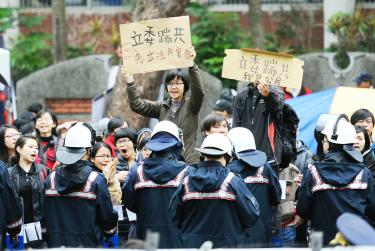Student activists occupying the legislative chamber yesterday rejected the Cabinet’s proposal for legislation to monitor cross-strait agreements, calling it an empty, insincere proposal aimed at deceiving the public.
“The Cabinet proposal is rather superficial, especially when [the premier] rejects our demand to apply the law to the review of the cross-strait service trade agreement,” student leader Chen Wei-ting (陳為廷) told a news conference at the Legislative Yuan.
“The proposal is empty, insincere and deceptive, and ignores the demands raised by the 500,000 people who took part in Sunday’s demonstration [in Taipei],” he said.
None of the protesters’ five major demands were included: the public’s participation in the reviews of cross-strait pacts, making all information public, stipulating the government’s responsibilities, human rights protection and granting the legislature the actual power to review cross-strait agreements.
“We hereby declare that the Executive Yuan has flunked class, because it failed to respond positively to the public’s demands,” Chen said.
Academia Sinica associate research law fellow Huang Kuo-chang (黃國昌) said that he agreed with Chen.
“In the proposal for the legislation to monitor cross-strait agreements raised by non-governmental organizations [NGOs], the legislature is given full power to review any cross-strait agreements, and the government would be required to report to the legislature on plans to sign an agreement with China prior to the beginning of negotiations for such a pact,” Huang said.
These mechanisms are absent from the Cabinet’s version, he said.
Human rights protection is an important element for many countries when signing free-trade agreements (FTA) with other nations, he said.
“In many FTAs, there are clauses concerning human rights protection, such as stipulating a suspension of the agreement when human rights are violated, or providing a way to appeal for those who feel that their rights have been compromised by the agreement,” Huang said.
“Unfortunately, such a mechanism does not exist in the Cabinet’s proposal,” he said.
Huang said the NGOs’ draft proposal also stipulates that if the government negotiates an agreement with China that involves a change in the political “status quo,” the agreement would have to be voted on by the public in a referendum before being ratified, but that was not mentioned in the Cabinet’s version either.
Attorney Lai Chung-chiang (賴中強) said that according to the NGOs’ draft proposal, the government not only has to report to the legislature before negotiating an agreement with China, but it also has to hold public hearings in advance.
The Cabinet’s proposal that only national security agencies would need to review a cross-strait pact before it was signed was not enough, the attorney said.
“One of the controversies concerning the cross-strait service trade pact is that the government only held public hearings after the pact was signed,” Lai said.
Source: Taipei Times - 2014/04/04





















